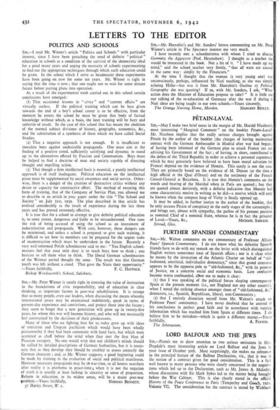LORD BALFOUR AND THE JEWS
SIR,—Permit me to draw attention to two serious omissions in Mrs. Dugdale's most interesting article on Lord Balfour and the Jews in your issue of October 30th. Most surprisingly, she makes no reference to the principal feature -Of the Balfour Declaration, viz., that it was in the nature of a contract given for good consideration. This is a fact well known to many persons who were closely concerned in the negotia- tions which led up to the Declaration, such as Mr, James A. Malcolm, whose discussions with Sir Mark Sykes led to the matter being brought before the War Cabinet. This is also clearly stated in the official History of the Peace Conference in Paris (Temperley and Gooch, 1920, Volume VI). The consideration for the contract is stated by Wicithsun Steed, then Editor of The Times, and in close touch with the negotia- tions from the very beginning, in his book, Through Thirty Years (Heineman; 1924, Volume II, page 392), as follows : "Prominent American Zionists used their influence in favour of American participation in the war." And again, "Zionism played a part in the defeat of the pan- Germanism with which so many Jewish financiers and business interests had been identified." I hope -Mrs. Dugdale will rectify this serious omission in the next edition of her interesting biography of Balfour.
The second omission is in regard to the proposal to partition Palestine into a Jewish State and an Arab State, recommended by the Peel Com- mission. Mrs. Dugdale says correctly that there were many who demurred "among both Jews and Arabs." This is only part of the truth. Many distinguished British statesmen also demurred. In the three debates on the proposals (two in the Lords and one in the Commons), Lloyd George, Winston Churchill, Lord Snell, Sir Archibald Sinclair, Lord Samuel and the Archbishop of Canterbury were among the distinguished representatives of British public opinion who spoke in opposition to the proposal. Winston Churchill, with his unerring instinct, revealed the military dangers of creating an Arab Sovereign State in full control of all the hills and strategic points in 96 per cent, of the area of Mandated Palestine, and also applied his characteristically mordant wit to the proposal. His words in the House of Commons are worth recalling: "One feels that the counsel now offered to us is like being urged to drink salt water when cast away on a raft." In the House of Lords, Lord Samuel, speaking not as a Jew but as a man who had been for many years British High Commis- sioner of Palestine, said, "They have put a Saar, a Polish Corridor, a half a dozen_Danzigs and Memels in a country the size of Wales." Your readers who are interested in this important question can find a very fair and full account of the matter in the Survey of the Royal Institute of International Affairs for 1937. On page 555, the Survey confirms that" considerable opposition in all parties" was revealed, and concludes, "It became clear that the motion approving the Government's policy could only be carried against a substantial minority in the Commons."—Yours obediently, S. LANDMAN. Bartlett House, 9-12 Basinghall Street, London, E.G. 2.



























 Previous page
Previous page